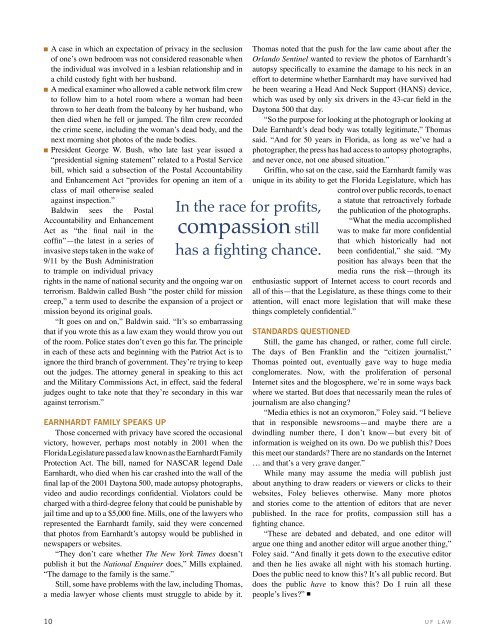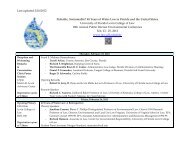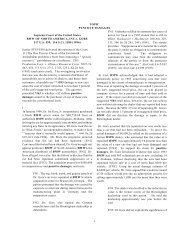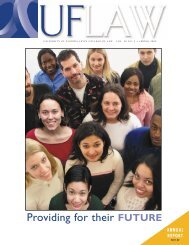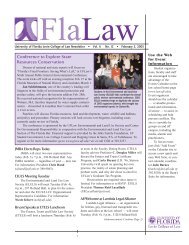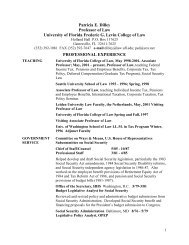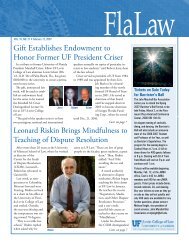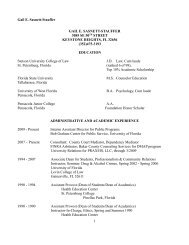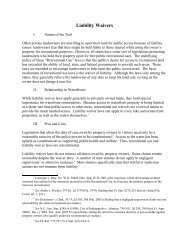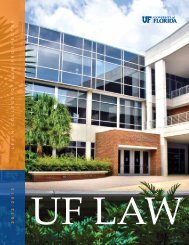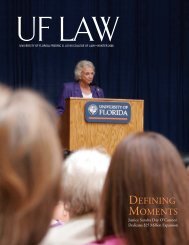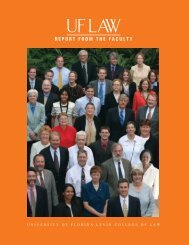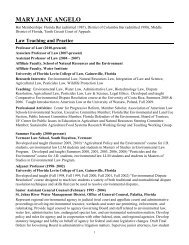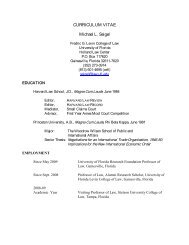Download Magazine - Levin College of Law - University of Florida
Download Magazine - Levin College of Law - University of Florida
Download Magazine - Levin College of Law - University of Florida
You also want an ePaper? Increase the reach of your titles
YUMPU automatically turns print PDFs into web optimized ePapers that Google loves.
■ A case in which an expectation <strong>of</strong> privacy in the seclusion<br />
<strong>of</strong> oneʼs own bedroom was not considered reasonable when<br />
the individual was involved in a lesbian relationship and in<br />
a child custody fight with her husband.<br />
■ A medical examiner who allowed a cable network film crew<br />
to follow him to a hotel room where a woman had been<br />
thrown to her death from the balcony by her husband, who<br />
then died when he fell or jumped. The film crew recorded<br />
the crime scene, including the womanʼs dead body, and the<br />
next morning shot photos <strong>of</strong> the nude bodies.<br />
■ President George W. Bush, who late last year issued a<br />
“presidential signing statement” related to a Postal Service<br />
bill, which said a subsection <strong>of</strong> the Postal Accountability<br />
and Enhancement Act “provides for opening an item <strong>of</strong> a<br />
class <strong>of</strong> mail otherwise sealed<br />
against inspection.”<br />
Baldwin sees the Postal<br />
Accountability and Enhancement<br />
Act as “the final nail in the<br />
c<strong>of</strong>fin”—the latest in a series <strong>of</strong><br />
invasive steps taken in the wake <strong>of</strong><br />
9/11 by the Bush Administration<br />
to trample on individual privacy<br />
rights in the name <strong>of</strong> national security and the ongoing war on<br />
terrorism. Baldwin called Bush “the poster child for mission<br />
creep,” a term used to describe the expansion <strong>of</strong> a project or<br />
mission beyond its original goals.<br />
“It goes on and on,” Baldwin said. “Itʼs so embarrassing<br />
that if you wrote this as a law exam they would throw you out<br />
<strong>of</strong> the room. Police states donʼt even go this far. The principle<br />
in each <strong>of</strong> these acts and beginning with the Patriot Act is to<br />
ignore the third branch <strong>of</strong> government. Theyʼre trying to keep<br />
out the judges. The attorney general in speaking to this act<br />
and the Military Commissions Act, in effect, said the federal<br />
judges ought to take note that theyʼre secondary in this war<br />
against terrorism.”<br />
EARNHARDT FAMILY SPEAKS UP<br />
Those concerned with privacy have scored the occasional<br />
victory, however, perhaps most notably in 2001 when the<br />
<strong>Florida</strong> Legislature passed a law known as the Earnhardt Family<br />
Protection Act. The bill, named for NASCAR legend Dale<br />
Earnhardt, who died when his car crashed into the wall <strong>of</strong> the<br />
final lap <strong>of</strong> the 2001 Daytona 500, made autopsy photographs,<br />
video and audio recordings confidential. Violators could be<br />
charged with a third-degree felony that could be punishable by<br />
jail time and up to a $5,000 fine. Mills, one <strong>of</strong> the lawyers who<br />
represented the Earnhardt family, said they were concerned<br />
that photos from Earnhardtʼs autopsy would be published in<br />
newspapers or websites.<br />
“They donʼt care whether The New York Times doesnʼt<br />
publish it but the National Enquirer does,” Mills explained.<br />
“The damage to the family is the same.”<br />
Still, some have problems with the law, including Thomas,<br />
a media lawyer whose clients must struggle to abide by it.<br />
In the race for pr<strong>of</strong>its,<br />
compassion still<br />
has a fighting chance.<br />
Thomas noted that the push for the law came about after the<br />
Orlando Sentinel wanted to review the photos <strong>of</strong> Earnhardtʼs<br />
autopsy specifically to examine the damage to his neck in an<br />
effort to determine whether Earnhardt may have survived had<br />
he been wearing a Head And Neck Support (HANS) device,<br />
which was used by only six drivers in the 43-car field in the<br />
Daytona 500 that day.<br />
“So the purpose for looking at the photograph or looking at<br />
Dale Earnhardtʼs dead body was totally legitimate,” Thomas<br />
said. “And for 50 years in <strong>Florida</strong>, as long as weʼve had a<br />
photographer, the press has had access to autopsy photographs,<br />
and never once, not one abused situation.”<br />
Griffin, who sat on the case, said the Earnhardt family was<br />
unique in its ability to get the <strong>Florida</strong> Legislature, which has<br />
control over public records, to enact<br />
a statute that retroactively forbade<br />
the publication <strong>of</strong> the photographs.<br />
“What the media accomplished<br />
was to make far more confidential<br />
that which historically had not<br />
been confidential,” she said. “My<br />
position has always been that the<br />
media runs the risk—through its<br />
enthusiastic support <strong>of</strong> Internet access to court records and<br />
all <strong>of</strong> this—that the Legislature, as these things come to their<br />
attention, will enact more legislation that will make these<br />
things completely confidential.”<br />
STANDARDS QUESTIONED<br />
Still, the game has changed, or rather, come full circle.<br />
The days <strong>of</strong> Ben Franklin and the “citizen journalist,”<br />
Thomas pointed out, eventually gave way to huge media<br />
conglomerates. Now, with the proliferation <strong>of</strong> personal<br />
Internet sites and the blogosphere, weʼre in some ways back<br />
where we started. But does that necessarily mean the rules <strong>of</strong><br />
journalism are also changing<br />
“Media ethics is not an oxymoron,” Foley said. “I believe<br />
that in responsible newsrooms—and maybe there are a<br />
dwindling number there, I donʼt know—but every bit <strong>of</strong><br />
information is weighed on its own. Do we publish this Does<br />
this meet our standards There are no standards on the Internet<br />
… and thatʼs a very grave danger.”<br />
While many may assume the media will publish just<br />
about anything to draw readers or viewers or clicks to their<br />
websites, Foley believes otherwise. Many more photos<br />
and stories come to the attention <strong>of</strong> editors that are never<br />
published. In the race for pr<strong>of</strong>its, compassion still has a<br />
fighting chance.<br />
“These are debated and debated, and one editor will<br />
argue one thing and another editor will argue another thing,”<br />
Foley said. “And finally it gets down to the executive editor<br />
and then he lies awake all night with his stomach hurting.<br />
Does the public need to know this Itʼs all public record. But<br />
does the public have to know this Do I ruin all these<br />
peopleʼs lives” ■<br />
10 U F L A W


